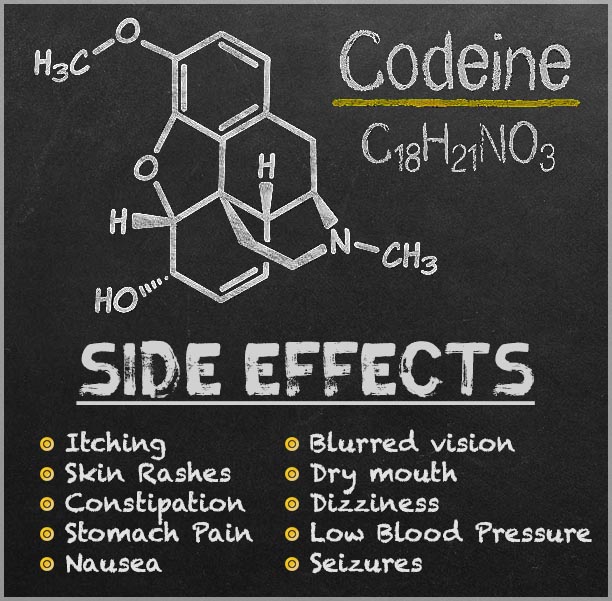Prescription drug abuse is a serious issue that affects millions of Americans every year. In fact, approximately 54 million people have used prescription medications for nonmedical purposes at least once during their lifetime.
Of all the prescription drugs that people abuse, painkillers like codeine are some of the most common.
Doctors prescribe these drugs frequently. But, just because they’re prescribed often, that doesn’t mean they’re safe. There are a number of serious codeine side effects that individuals can experience immediately after taking the drug or after using it for an extended period of time.
Read on to learn more about the side effects of codeine and learn some strategies for dealing with codeine dependence.
What is Codeine?
Codeine is a painkiller. It belongs to a group of medications known as narcotic analgesics.
It’s typically used to provide mild-to-moderate pain relief. Doctors may also prescribe it to treat coughs. When codeine is prescribed to treat coughs, it’s often combined with acetaminophen, aspirin, promethazine, and/or carisoprodol.
Codeine is purely a symptom management drug. It does not treat the cause of a person’s symptoms or speed up their recovery.
Like other narcotic painkillers, codeine acts as a central nervous system (CNS) depressant to provide pain relief. Essentially, it changes the way the brain responds to pain signals.
When it’s consumed, codeine provides users with immediate feelings of relaxation, drowsiness, euphoria, and a slowed heart rate. Codeine can also cause a variety of other, less pleasant effects.
Codeine Side Effects
Many physicians consider codeine to be a safe drug. Because of this, they write prescriptions for it left and right, even when another, less habit-forming drug could be used in its place.

There are a lot of potentially dangerous side effects associated with it, including the eight listed below:
- Itching and/or skin rashes
- Digestive issues like constipation and stomach pain
- Nausea
- Blurred vision
- Dry mouth
- Dizziness
- Low blood pressure
- Seizures
Most people experience these side effects shortly after they begin using codeine. These side effects are also common after an individual’s doctor has increased their dosage.
Due to the fact that it depresses the central nervous system, long-term codeine abuse can also cause other, even more serious health problems, including the following:
- Gastrointestinal disorders
- Clouded thinking
- Impaired judgment
- Depressive symptoms
- Drastically low blood pressure and slowed heart rate
- Liver disorders
Because of its impact on the brain, codeine, like other narcotics, also has the potential to be habit-forming. If it’s used too frequently, an individual will likely experience withdrawal symptoms when they try to stop taking codeine.
Common codeine withdrawal symptoms include:
- Sweating
- Chills
- Fatigue
- Irritability and mood swings
- Digestive distress
- Diarrhea
Clearly, codeine can cause a variety of serious health issues, especially when it’s abused long-term. Because of the risks associated with codeine use, it’s important to be on the lookout for signs of codeine dependence.
Signs of Codeine Dependence
If an individual is struggling with codeine dependence or addiction, they may exhibit the following symptoms:
- Dizziness
- Staggering
- Itchy skin and frequent scratching (especially on the nose)
- Constricted pupils
- Slow breathing rate
- Mental confusion
- Constipation
- A blue tinge to the lips and/or fingernails
- Nausea
- Vomiting
- Delirium
- Hallucinations
- Seizures
Someone who is struggling with codeine addiction may also exhibit other signs of drug dependence.
In addition to the physical changes and side effects listed above, an individual struggling with codeine dependence may start to exhibit changes in their personality and lifestyle.
For example, they may begin spending time with a new friend group. Or, they may isolate themselves altogether and stop spending time with anyone.
They may also start neglecting their responsibilities at work or at home, or they might have trouble paying their bills and staying on top of their finances.
How to Deal with Codeine Addiction
If you or someone you know is experiencing any of these signs and symptoms of dependence or withdrawal, it’s important to seek help and work with a professional to overcome the addiction.
Avoid Quitting Cold Turkey
Some people claim that the only way to overcome a drug addiction is to give up the drug cold turkey.
This approach might work for some, but it’s also highly dangerous. This is especially true when you’re trying to give up a drug like codeine, which comes with some very unpleasant withdrawal symptoms.
If you try to give up codeine cold turkey, you’ll likely experience withdrawal symptoms that can lead to serious health problems. For example, vomiting or diarrhea can lead to extreme dehydration.
Work with a Doctor
Instead of giving up codeine cold turkey, it’s important to work with a doctor and work through a medically supervised detox protocol.
A doctor can give you medication to help minimize the symptoms of codeine withdrawal. The most frequently used drug for codeine addiction is Suboxone. This is a drug that contains buprenorphine and naloxone.
Buprenorphine helps provide relief from withdrawal symptoms. Naloxone, on the other hand, helps to prevent and/or reverse the intoxicating effects of opiates in the event that a patient relapses.
Doctors will also use naloxone to treat opiate overdoses.
Consider Inpatient Rehabilitation
Many people who are struggling with codeine dependence experience better, longer-lasting results when they go to an inpatient rehabilitation center.
An inpatient rehabilitation center offers extensive support, including group counseling and specialized counseling to individuals who struggle with addiction. This comprehensive support can give addicts to the tools they need to live happy, healthy lives.
Spending 30 to 90 days (the length of a typical inpatient program) receiving uninterrupted care gives addicts an opportunity to work on their recovery while minimizing stress and outside temptations.
Inpatient rehabilitation is also very helpful to individuals who suffer from co-occurring mental health conditions like depression, anxiety, or post-traumatic stress disorder (PTSD).
Get Help Today
Are you struggling with codeine addiction? Are you experiencing some negative codeine side effects?
If you need help giving up your dependence on codeine, contact us at Revive Detox in Los Angeles today.
We provide our clients with top-tier, 24-7 support to help them get clean and stay clean.Most PPO Health
